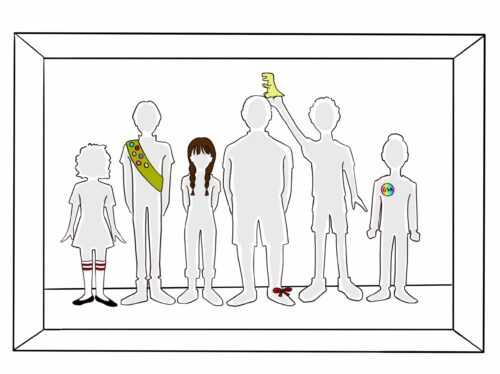The 25th Annual Putnam County Spelling Bee is now running at the Loeb Experimental Theater from Feb. 29 to March 8. With music and lyrics by William Finn and book by Rachel Sheinkin, Spelling Bee is a musical comedy about a group of six middle school students competing in, you guessed it, a spelling bee. Each student has their own unique personality and struggles, as well as motivations for winning the competition. Ranging from wanting to fit in, to dealing with family pressure, the audience learns more about them and watches them develop throughout the 90-minute show.
The story lacks a singular protagonist, instead opting to explore six individual characters and their experience throughout the spelling bee. Rona Lisa Peretti (Caitlin Beirne ’25), the moderator, Vice Principal Douglas Panch (Max Allison ’25), the word pronouncer, and Mitch Mahoney (Madison Valley ’25), the “comfort counselor,” provide a sense of encouragement and humor along the way.
Chip Tolentino (Elio Kennedy-Yoon ’26), last year’s spelling bee champion, begins the lineup of contestants. Additional contestants in the spelling bee include Olive Ostrovsky (Roseanne Strategos ’25), William Barfee (Justice Sirotek ’27), Logainne SchwartzandGrubenierre (Finley McElhinney ’27), Leafy Coneybear (David Peters ’25), and Marcy Park (Amelia Williams ’27).
The show digresses into a variety of backstories, ultimately connecting them all to what the 25th Annual Putnam County Spelling Bee means to the students. Directed by Julia Grullon ’24 and produced by Teddy Tsui-Rosen ’25, Sara Rhouate ’26, Luisa Shida ’25, and Adam Wang ’26, through a combination of comedy and drama, this incredible production uses improv to keep the audience engaged and the plot spontaneous. At one point, four audience members are even selected to come onstage and “participate” in the spelling bee alongside the cast. This adds an engaging element and you slowly start rooting for the audience members to spell the word correctly. When the audience member overstays their welcome by spelling too many words correctly, it’s interesting to see the hilarious Allison and Beirne scrambling, improvising lines, and finding a harder word to spell. Blurring the line between performer and spectator, this break in the fourth wall ultimately enhances the experience and keeps the audience captivated.
Character development is the hallmark of the narrative, slowly revealing the layers of different vulnerabilities each character has. Olive Ostrovsky slowly gets more confident and accepting of herself as her lines get loud and Strategos’s demeanor becomes assertive. The dynamic interplay between the different characters, as they navigate through the competition, catalyzes their individual transformational arcs. From discovering that true victory does not necessarily lie in the competition, to having to deal with a distraction caused by an erection, the play constantly reminds the audience of the importance of self-acceptance and embracing one’s uniqueness. The show prompts audiences to question the notion of conformity and reminds them of the importance of staying true to oneself.
The Loeb “black box” Experimental Theater allows the production to unfold in an intimate atmosphere, immersing the audience into the performance. Unlike the 550-plus-seat Loeb Proscenium Theater, the Loeb Ex is much smaller and simpler, as the audience of 50 is seated just ten feet from the actors. This proximity makes every gesture and facial expression take on a heightened significance, facilitating a nuanced exploration of the story.
The set consisted of benches on which the actors sat and a desk for the two adults in the play. There were two wall-like backdrops with the Spelling Bee being advertised and the balcony was briefly used for one scene with Jesus. During the play, strobe lights were often used and the live band provided a lighthearted ambiance. The costumes emphasized the distinct characters and told a story in themselves—Leaf’s dinosaur patches especially added to his endearing characterization. With minimal effects and technical elements during the scenes, the weight of the performance rested heavily on the actors themselves and the chemistry they shared on stage, before jumping into elaborate lighting for the numbers. As the focus shifted onto the actors, the lack of a grand stage and elaborate set design gave the actors freedom to fully inhabit their characters and draw the audience deeper into the emotional journey. Actors were able to rely on their own physicality and presence to further the story, organically allowing for moments of improv to engage with the audience. The close proximity fostered a sense of connection, making the audience feel like active participants in the unfolding narrative.
The production of the 25th Annual Putnam County Spelling Bee is a unique and unforgettable theatrical experience, where the power of the actors’ performances and the intimacy of the space combine to create a truly immersive and engaging production. As the play draws to a close, the audience is left with a profound sense of connection to the characters and their experiences, ensuring a lasting impact.Denny Gulia Janovski ’26 (dguliajanovski@college.harvard.edu) writes Arts for the Independent.

